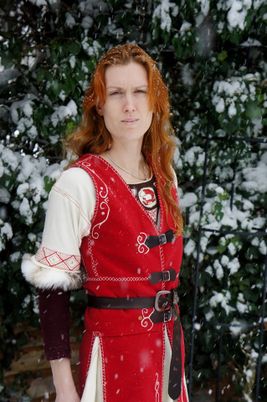Varushka economic interests
No edit summary |
No edit summary |
||
| Line 1: | Line 1: | ||
{{CaptionedImage|file=VarushkanEmbroidery3.jpg|width=267|align=left}} | {{CaptionedImage|file=VarushkanEmbroidery3.jpg|width=267|align=left|caption Costume by Jo Perridge}} | ||
Varushka may be dangerous, but it is also rich. Varushka does not export many finished goods. Varushkan craftsmen tend to craft for their family and community, not for the wider world. The true wealth of the nation lies in raw materials, and in that it has become a great provider for the Empire. It is famous for its high quality furs, which are sold all over the Empire, and the nation is home to many species of majestic hardwoods whose timber is in high demand. Not just timber is produced from the woods; amber is a common export, and many Varushkan men and women sport amber jewellery. | Varushka may be dangerous, but it is also rich. Varushka does not export many finished goods. Varushkan craftsmen tend to craft for their family and community, not for the wider world. The true wealth of the nation lies in raw materials, and in that it has become a great provider for the Empire. It is famous for its high quality furs, which are sold all over the Empire, and the nation is home to many species of majestic hardwoods whose timber is in high demand. Not just timber is produced from the woods; amber is a common export, and many Varushkan men and women sport amber jewellery. | ||
Revision as of 13:21, 25 March 2013
Varushka may be dangerous, but it is also rich. Varushka does not export many finished goods. Varushkan craftsmen tend to craft for their family and community, not for the wider world. The true wealth of the nation lies in raw materials, and in that it has become a great provider for the Empire. It is famous for its high quality furs, which are sold all over the Empire, and the nation is home to many species of majestic hardwoods whose timber is in high demand. Not just timber is produced from the woods; amber is a common export, and many Varushkan men and women sport amber jewellery.
The bones of the land itself are valuable. There are rich deposits of iron and precious metals, and quarries that produce both fine quality stone and beautiful precious gemstones. Honey and mead are both common Varushkan exports. Varushkan honey is a delicacy, with different regions producing different types of honey. Connoisseurs talk about Varushkan honey in the same way one might discuss fine wine or cheese.
In Varushka, nothing is free. The supernatural threats of the nation often seem strongest where the wealth is greatest, and those seeking to make their fortunes must contend with the malign creatures that come in darkness. As a result, operating a Varushkan mine or lumberyard, or entering the forests to hunt and trap, is not an entirely mundane business. It is dangerous to harvest the bounty of an area that is claimed by a sovereign unless the creature is subject to a compact, agreement or binding. Only by following these rules may the resources be gathered safely. For example, a Varushkan lumberjack might mark trees in a certain area with a sigil the day before they plan to fell them; if the sigil is gone when they return the next morning, they know that the tree is claimed by a sovereign and cutting it down will have dire consequences.
While Varushka has towns that serve as trade hubs, it has no cities – but this was not always the case. Temeschwar, the greatest city in the north, was once part of Varushka. When the Empire was formed, Maria Ivanova, the boyar of Temeschwar, elected to join her city's fortunes with those of the League rather than remain part of Varushka. While some Varushkans were outraged by this apparent treachery, the majority simply shrugged. The defence of Temeschwar was now no longer their concern; the inhabitants had simply looked for protection elsewhere. Relations remain mostly good, and the city is still a central trade hub for many Varushkan traders. The symbiotic relationship between Varushka – rich in raw materials – and the League – rich in worked goods – has made the fortunes of merchants from both nations.
The Navarr are welcome if irregular visitors to the land. They ensure that every settlement receives news of the wider Empire and provide additional protection to those who want to travel long distances. For their part, visiting Navarr know to keep to the roads and to consult the wise ones and wardens whenever they can, to ensure they do not accidentally break some important taboo and bring disaster down on their own heads and the heads of the people they move amongst.
Many Varushkan villages employ Stzena, local musicians who perform at local civic events and celebrations.
Outposts
Not all Varushkans dwell in the vales; there are countless isolated mines, quarries and similar across the nation where hard men and women work to make their living. Few of these outposts are joined to the network of warded roads that cross the nation and lacking the constant vigilance of a community they must be guarded solely by schlacta. Those who work there are often regarded as foolhardy, desperately gambling their lives to make their fortune.
Most outposts are ruled by a merchant boyar. The best eventually grow to become a true vale, as people settle there to raise a family under the protection of the boyar and their schlacta. The worst have a reputation for iron rule and cruel discipline, a refuge for exiles and anyone prepared to wield an axe and follow orders. Most outposts were worked by orc slaves in the past. That practice has long been abolished but many still retain a fetid air and often employ criminals working off a punishment. Varushkan magistrates keep a close eye on those they can travel to, but the more isolated outposts are difficult to reach.
